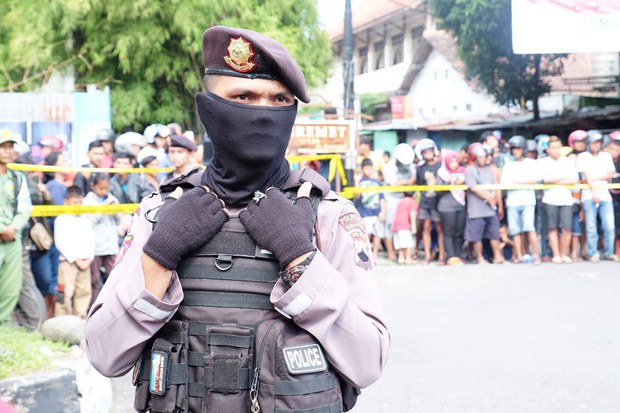Islamic State Linked to Suicide Bombing in Indonesian City: Police
2016.07.05
Solo
 An officer stands guard in front of police headquarters in Solo, Central Java, Indonesia, following a suicide attack, July 5, 2016.
An officer stands guard in front of police headquarters in Solo, Central Java, Indonesia, following a suicide attack, July 5, 2016.
An Islamic State-linked suicide bomber attacked police headquarters in the Central Javanese city of Solo on Tuesday, blowing himself up and injuring an officer, Indonesian authorities said.
The bombing occurred on the eve of the Eid-ul-Fitr holiday in Indonesia that marks the end of Ramadan, and was the first IS-linked attack in Indonesia since an attack killed eight people in Jakarta on Jan. 14, officials said.
Police identified the attacker as Nur Rohman, 31, through an I.D. card found at the scene.
Nur was a member of a local terror cell headed by Indonesian militant Arif Hidayatullah (alias Abu Mushab), National Police Chief Gen. Badrodin Haiti told reporters after inspecting the blast site.
Nur had evaded capture when police arrested Abu in December, Badrodin said. Abu was arrested while on his way to work at an automotive company, police said at the time. He allegedly had a list of IS supporters in Indonesia and a photocopy of a book about explosives.
“He learned about bomb making at that time,” Badrodin said of Nur, adding that his suicide mission was linked to calls by IS leaders instructing followers of the Middle East-based extremist group to launch terror attacks during the Islamic fasting month of Ramadan.
Badrodin said Mushab was part of a network whose members include Bahrun Naim, the man whom Indonesian police claim masterminded the January attack in Jakarta that killed eight people, including four of the perpetrators.
Mushab’s role was to recruit Indonesians to join the IS after he received funding from Bahrun Naim, who lives in Syria, Badrodin said.
A Jakarta think-tank, the Institute for Policy Analysis of Conflict (IPAC) later challenged Haiti’s assertion, claiming that Naim did not the mastermind the January attack. IPAC instead blamed a local group, Jamaah Anshar Khilafah whose ideological leader is imprisoned Indonesian Muslim cleric Aman Abdurrahman, for being behind the attack.
On June 8, police said they arrested three men who were inspired by IS to carry out terror plots targeting public places and government offices in Surabaya, East Java, during Ramadan. One of the suspects was linked to Abu Jandal, an Indonesian fighting for IS in the Middle East, according to officials.
Whereabouts unknown: in-law
The bomber in Tuesday’s attack arrived at the station house on a motorcycle at 7:35 a.m. – just before police officers were to hold a meeting there, policemen and witnesses told BenarNews at the scene.
As Nur Rohman tried to enter the compound officer Bambang Adi intercepted him. But Nur detonated the bomb, killing himself and injuring Bambang who sustained facial wounds, police said.
Nur was a resident of Sangkrah village in Solo.
“We didn’t know his whereabouts,” Nur’s sister-in-law, Yayuk, told BenarNews, adding that he had left the family about a year ago.
Jokowi urges calm
Ramadan-time attacks targeting the police are not new for Solo, a reputed hotbed for radicalism in Indonesia
Just before Eid-ul-Fitr on Aug. 17, 2012, motorcyclists shot a police security post, injuring two police officers. A day later, motorcyclists threw a grenade into another police post in Solo, but no one was injured.
Despite Tuesday’s attack, Solo Mayor F.X. Hadi Rudyatmo said all Eid activities would go ahead as planned.
“There is nothing to fear,” Rudyatmo told reporters.
Meanwhile, Indonesian President Joko “Jokowi” Widodo, a native and former mayor of Solo, spoke to the community.
“We hope people remain calm on this last fasting day. There is no need to be scared,” he told reporters in Padang, the capital city of West Sumatera, where he traveled to celebrate Eid.
“I have ordered the National Police chief to search and uncover the networks associated with the suicide bombing,” Jokowi said.
As of December 2015, Indonesian officials estimated that about 800 Indonesian radicals were fighting in Syria or Iraq, according to a U.S. State Department report on terrorism released last month.
Indonesian officials identified 284 citizens actively involved in fighting in Iraq and Syria and are investigating another 516, the report said.
Indonesian officials also believe that 52 Indonesian terrorist fighters have died in Syria and estimate that another 60 to 100 have returned to Indonesia.
Tia Asmara in Jakarta contributed to this report.







